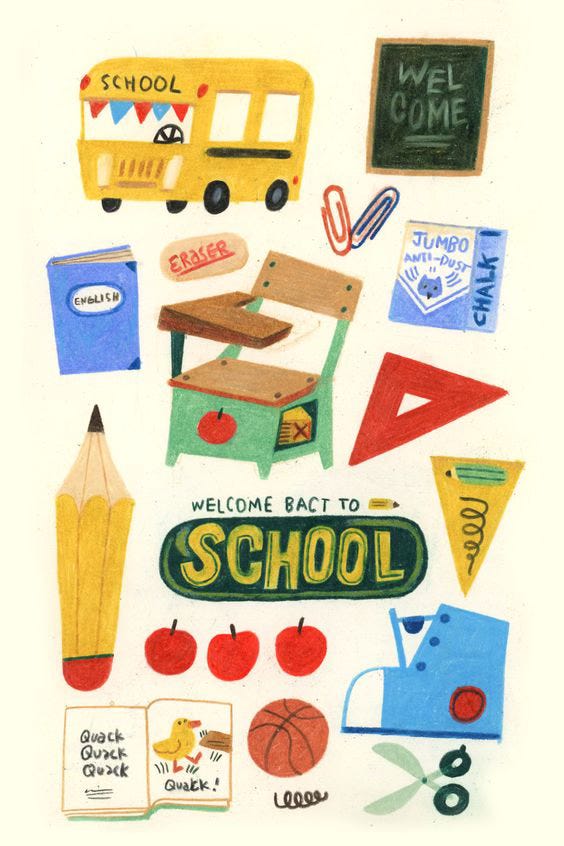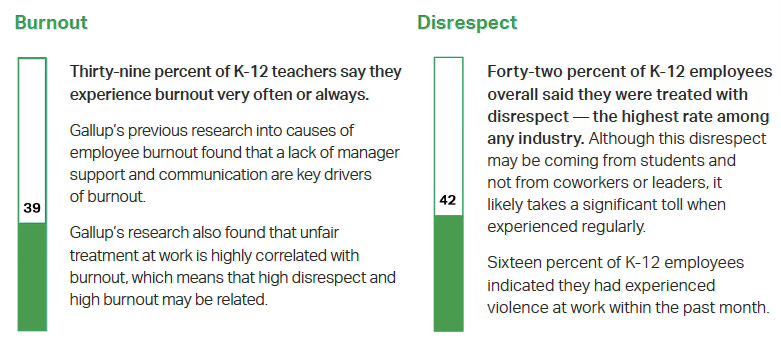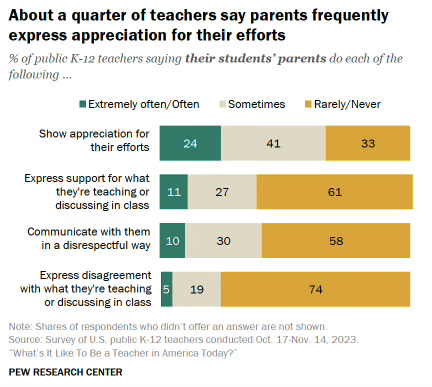You may have heard about the recently published viral article discussing the U.S. Surgeon General’s Parental Mental Health & Well Being report. The discourse surrounding this report is both ample and important.
Talking about the health & well being of educators also deserves some air time.
Gallup published their 2024 Schools Report for K-12 Education, in which they analyze data gathered from approximately 18,000-19,000 former educators (some dropped out over the course of the study) who left the field between 2019 and 2023. Throughout the process they were asked a series of questions over 10 interviews about their teaching experience and their reasons for leaving jobs in education; to give a bit more insight into the sample, the average age of the participants was 42 years old [28-56 y.o.] with an average of 14 years experience [1.5-28 years], and 60% of the group identified as female. Neither racial and socioeconomic background nor marital and parental status of group members was specified in the report. Because the report is basically composed as a digestible meta-analysis, data from other articles is incorporated in the findings. Links to those studies can be found in the Gallup report and below.1

Here are some of the data points2 that stuck out to me the most:
A majority (76%) of parents are happy about their child’s education and approve of their teachers (71%).
In comparison, out of the members of the public who were surveyed, 63% report being dissatisfied with the education system. Gallup did not define “the public,” but let’s assume that they are adults who do not currently have school-aged children, and as a cohort are probably being utilized as a control group. Their exact reasons were not shared in the report.
31% of K-12 teachers report being engaged in their jobs, citing that they feel “connected to the mission and purpose of their work.” However, the data also shows that they are “less likely to be respected at work” and “more likely to experience frequent burnout” compared to their peers in other industries. Both of these factors were specifically named as causes that led to the 10% turnover rate in 2022, which was an over 4% increase compared to pre-pandemic school years.
42% of educators overall reported being treated disrespectfully, “the highest rate among any industry.” ANY INDUSTRY!
As you see from this infographic, Gallup found a correlation between unfair treatment and burnout. When almost half of a workforce feels disrespected, it can no longer be surprising that there will be increasing amounts of turnover both during the school year and between school years. You now know as readers of this newsletter how important predictability and consistency is for kids, so imagine the downwind effect this has on children’s capacities to learn.

Data from a study conducted by Pew Research in 2023 revealed complimentary data to the Gallup report:
These results are based off of 2,531 K-12 teachers’ self-completed online surveys, which were conducted in English from mid-October to mid-November of that year.
Teachers feel that their school administrators (53%), peers (58%), and students (52%) trust them “a great deal,” while only 30% feel parents of their students trust them to that extent.
3 in 10 teachers report that they will be looking for a new job in the next year, and 40% of those individuals aim to look for “a new job NOT in education.”
Only 24% of teachers said that parents/caregivers consistently show appreciation for their efforts. 40% of the group shared that parents/caregivers communicate with them in a disrespectful way*.
*This specific data point is very important to compare with the Gallup poll results, because a) a separate survey agency collected the data in an entirely different study and b) a different question garnered the exact same result. Consistency is key in surveys, where repetition of a question can alter the way someone answers. Oftentimes, researchers will ask the same question multiple ways within one survey to ensure reliability of a participant’s answers. Two separate sample groups answering two completely different surveys generating basically the same result? That data is has strong validity…aka, it’s highly accurate.

But how does this affect me and my kid? Why should I care if teachers are happy with their jobs?
Well, research shows us that the “quality of the student-teacher relationship” has been found to be, “significantly related to a child’s academic performance.”3 We also know that parent involvement and attitudes about teachers impact children’s relationships with their teachers. Not everyone is attempting to raise a Rhodes Scholar, but every student wants to and deserves to feel successful at school. So when your child feels less connected to or trusting of their teachers, they may not perform at their highest potential and within their individual zone of proximal development.
Taking into account everyone’s stressors, let’s all approach this school year with a new frame of mind. Here are some easy ways you can ensure your children’s teachers, related service providers, and school administrators feel respected and supported throughout the school year:
You are a language model for your child. If you communicate with classroom staff kindly and respectfully, they will too. If you initiate productive conversations to problem solve, they will too. Just saying “thank you” in an email or in a parent-teacher conference genuinely goes such a long way for educators, support staff, and administrators alike.
School professionals really care about your kids and are caring for them, but they are not the caregivers. You are the caregivers. Teachers need your involvement in their education, and would love for you to actively and respectfully collaborate with them in successful moments as well as challenging ones.
If your child experiences notable challenges this year, try to refrain from blaming it entirely on the staff. They are highly educated and trained professional adults who are happy to have conversations with you and problem solve! Perhaps it is the way a situation is being approached in the classroom, but more often that not it is an amalgamation of reasons and not just one thing or person. Placing blame entirely on the staff is never going to help the situation. Let’s work together instead.
Your child is your whole universe, but educators are tending to multiple universes all at once. They would absolutely love to honor your kid’s specific needs all day long, but it’s just not always possible. You can start by helping your child to successfully self-regulate, resolve conflicts, and complete tasks independently at home. Stay tuned for more on that last one in the next newsletter :)
Happy Beginning of the School Year Everyone!
https://www.rand.org/pubs/research_reports/RRA956-14.html
https://news.gallup.com/poll/510401/education-satisfaction-ties-record-low.aspx
https://www.gallup.com/education/608843/state-of-schools-report-2024.aspx?thank-you-report-form=1
https://www.ncbi.nlm.nih.gov/pmc/articles/PMC3020099/#:~:text=Based%20on%20previous%20research%2C%20it,child's%20self%2Dperception%20of%20cognitive




